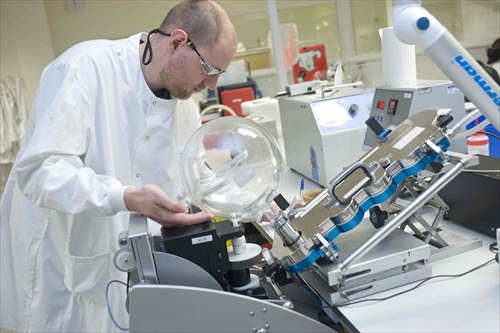Channels
Special Offers & Promotions
Post Grad Skills Shortage Prompts Innovative Response by University of Hertfordshire and Melbourn Scientific
The ‘learn while you earn’ approach to specialist science courses is part of a drive by the University of Hertfordshire to address the intensifying skills shortage faced by UK pharmaceutical companies
The University is collaborating with leading life science company Melbourn Scientific to develop a new part-time MSc degree in Pharmaceutical Sciences that reflects the needs of industry.
Employers in the pharmaceutical industry have observed a shortage of applicants with appropriate practical skills, an issue first highlighted by the Association of the British Pharmaceutical Industry in 2008. Part of the problem is that science courses with an intensive practical component are resource-hungry for academic institutions and the number of applicants has fallen in recent years.
 Dr Darragh Murnane, Associate Dean of the School of Life and Medical Sciences, University of Hertfordshire, saw an opportunity to respond to the challenge and engaged the support of Melbourn Scientific, a leading contract research company that provides chemical analysis and formulation development for the pharma and biotech industry.
Dr Darragh Murnane, Associate Dean of the School of Life and Medical Sciences, University of Hertfordshire, saw an opportunity to respond to the challenge and engaged the support of Melbourn Scientific, a leading contract research company that provides chemical analysis and formulation development for the pharma and biotech industry.
The result is a new MSc degree in Pharmaceutical Sciences that launched in October 2012 with applications open now for 2013. The course is heavily practical-based allowing for specialisation in product formulation and development as well as pharmaceutical analysis; areas identified as key for the industry. It can be completed while the student works part-time making the course more accessible to UK students.
Melbourn Scientific CEO Mark Hammond comments that a highly skilled and flexible workforce is essential to the competitiveness of his organisation. He says: “The UK pharmaceutical industry is highly regulated and we have a reputation for excellence as a result. Well-trained and motivated staff are crucial to our success both as a company and as part of ‘UK Plc’, being able to offer a high quality, reliable and responsive service enables us to compete on a world stage.
“Continuous professional development is part of this and I am a strong believer in work placements and day-release to build up skills,” he says. “Unfortunately we have seen a reduction in the number of universities able to offer these opportunities both to students and to those already in employment.
“When Darragh asked for our input in developing the MSc syllabus, it was the first time we had worked so proactively with a university to identify the exact skills needed from the scientists we recruit. The course now includes a specific module on regulatory affairs that we thought was vital to our industry.”
Dr Murnane believes that the collaboration with Melbourn has been highly beneficial:
“By partnering with local companies, we feel we can provide currency of knowledge to our students and really prepare them for the workplace. Additionally, we can play a part in supporting the pharmaceutical industry develop its workforce.”
The University of Hertfordshire is one of the UK’s leading business-facing universities. Its pharmacy degrees are developed to support regional partners and to address the graduate skills that they require. Located at the centre of the UK’s golden triangle of pharmaceutical research, it has drawn on expert opinion to design a course, which is fit for purpose.
Derek Solomon, Operations Director at Melbourn Scientific comments: “It’s important for companies to be involved in postgraduate education and we’re delighted to begin this partnership. We are going to host the MSc class here at Melbourn Scientific for practical teaching around Good Manufacturing Practice, as well as regulatory developments. We feel the University of Hertfordshire’s approach to postgraduate teaching suits our company.”
The Higher Education Commission reported recently that the post-graduate system in the UK’s universities is in need of reform in order to avoid long-term problems for the UK’s economy. However, increase in student fees and changes to UK visa regulations in the last two years have led to a reduction in student recruitment.
Mark Hammond argues that rather than serve as a ‘brain drain’, UK-trained overseas postgraduates have served the pharmaceutical industry well, for example, facilitating the engagement of leading pharmaceutical companies with the developing markets of the BRIC economies.
“The UK pharmaceutical industry needs more science specialists, where they originate from is irrelevant. These specialists either stay in the UK to provide valuable skills to the companies here or they act as ambassadors overseas. Knowledge of the European regulatory environment, and our culture, will make it easier for UK companies to engage with them in their future positions,” he concludes.
Further information about Melbourn Scientific
Media Partners



